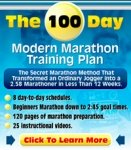No Need For "The Marathon Wall". Good Marathon Race Nutrition Will Help Prevent It.
How to Determine What to Eat And Drink During the Marathon Race!
 Ready for some marathon race nutrition ? For any level runners, you absolutely have to make this a priority in your marathon training schedule. Ready for some marathon race nutrition ? For any level runners, you absolutely have to make this a priority in your marathon training schedule.
See, there is no way - at almost no level, you can finish at your best without a good marathon race day diet.
It should be part of your program, parts of the master plan.
- in the heat of New York marathon support,
- in front of the Berlin marathon crowd
- or in your local marathon race your body will need that fuel.
Starting gun goes off. You approach the first drink station. You are feeling fine and have prepared well. You have eaten a good pre-race breakfast as part of your marathon diet.
Now you ask yourself :
"How much to drink ? How much to eat ?"
This article is right on that question. And hope to determine beforehand those two important questions.
So here we go...
Stick To the Marathon Drinks...If You Plan to Run the Whole Way.
First off. If you plan to run the marathon the whole way and your goal is a specific time it is advisable to stick to drinks/fluid only.
Is your goal to finish in a walk/run the marathon, you can add in there a banana or energy-bar if this is provided.
Alright, lets make this as practical as possible.
And divide this into three parts.
- Energy calculation
- Examples
- External factors such as the weather
 Energy intake calculation Energy intake calculation
This is how much to drink during a marathon - trying to not get to technical!
A normal cup of sports drink contains about 60 grams of carbohydrates (8 oz or 240 ml of fluid).
However, in the marathon races ,what they hand to it is usually somewhat watered out. And the cups handed to you contains usually only about half of a normal cup.
- Which means that one marathoncup give you about 4 oz or 120 ml of fluid.
- And 15-20 grams of carbohydrates. 15-20 grams of carbohydrates is 60-90 calories.
Lets say 80 calories average pr cup.
Each Marathon Cup You Drink Equals 80 Calories Of Intake
That gives you about 80 calories each time you drink a cup. And 4 oz/ 120 ml fluid.
Ideally you (because you have done your pre race nutritional preparations) have a storage avaliable of 500 to 600 grams of glycogen in your body.
Now that 400 to 600 gram storage translates to between 1600 and 2400 calories stored. In your body. Pre-race.
 For each hour you run the marathon, you will use between 800 and 1300 calories. For each hour you run the marathon, you will use between 800 and 1300 calories.
The variation is because of body type and temperature.
If you walk / run, it can be much less. Down to 400-600 calories pr hour.
You should test this out in you training for the marathon, as well as have good marathon pace strategies.
Both these aspects you can read about under the "marathon running" section in the leftside menue.
Now. Lets focus on the marathon race nutrition.
 And Lets Apply This "Theory" With Some Simple Examples : And Lets Apply This "Theory" With Some Simple Examples :
Example # 1 Your goal is 3.30 hours. You run all the way. You are a medium built man.
- You have 2200 stored to start with.
- You use 1000 calories pr hour.
- You run 3.30 hours.
- So you need 3500 total to cover the 3.30.
- = You come short with about 1300.
That means that you need to drink about 16 of the marathon cups of 80 calories during your race.
This gives about 1300 calories and a total fluid intake of about 400 ml/hour.
Example #2 Your Goal is 3 Hours and You Are a More Heavier Runner
- You have 2500 to start with. You are bigger and have a larger glycogen store to begin with.
- You use 1300 pr hour.
- You run for 3 hours.
- So you need 3900 total. You come short with 1400 calories.
During the race, make sure to drink about 17 of the marathon cups
Example # 3 You Want to Finish. You Walk and Run For 4 Hour 30 Minutes.
The intensity is much lower for the run,walkers. And you spent far less energy during the marathon.
- You have 2200 to start with
- You use 600 pr hour
- You walk,run for 4.30
- So you need 2700 total.
- You come short with 500 calories
During the race, make sure to drink about 6 cups of sports drink. This is only 100 to 200 ml of fluid pr hour but you want to avoid overdrinking.
Which is very common for the slower runners and can cause a condition called hyponatremia ; in more general terms water intoxication.
To sum it up :
What you are seeing here is that slower runners generally needs less drinks (especially if temperature is normal) and the need for drinks/energy can vary quite a bit during a marathon from runner to runner. Depending on speed, body size and female/male.
 Last Thing Up ; What About the Weather in Regards To Marathon Race Nutrition ? Last Thing Up ; What About the Weather in Regards To Marathon Race Nutrition ?
One last question to answer. What if it is really hot and I sweat alot?
Then you should drink more than under normal weather. But only if you feel thirsty and it is bothering you. No need to overdrink.
It is much more important to pace down and not over-run early under those conditions.
Well, this were some general guidelines to survive the demands of the marathon race nutrition.
In the future, look for a nutrition calculator that I am working on. With this tool it will be possible to calculate almost exactly your marathon race nutrition needs.
I wish you luck and please see the articles below for more related information. More articles on marathon nutrition and more you'll find there. |
 Enter email address to subscribe for monthly updates and tips. I will not spam your account, only occasional relevant information :)
Enter email address to subscribe for monthly updates and tips. I will not spam your account, only occasional relevant information :)


 Ready for some marathon race nutrition ? For any level runners, you absolutely have to make this a priority in your marathon training schedule.
Ready for some marathon race nutrition ? For any level runners, you absolutely have to make this a priority in your marathon training schedule.  For each hour you run the marathon, you will use between 800 and 1300 calories.
For each hour you run the marathon, you will use between 800 and 1300 calories.